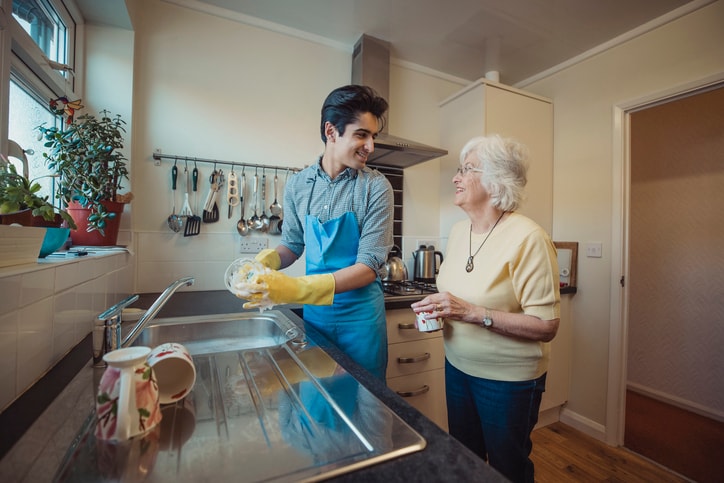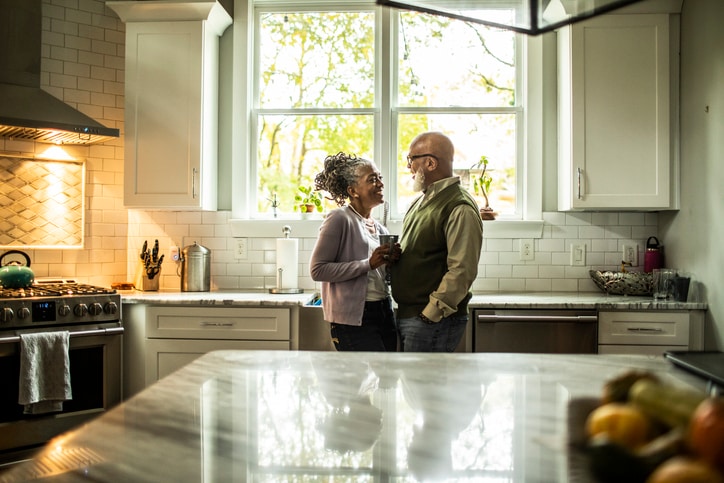Many seniors want to maintain independent lives as they grow older. However, it’s not uncommon for them to face challenges like limited mobility, cognitive decline or social isolation as partners or friends pass away. Some older adults might not need hands-on daily medical care but may lack critical social interaction, emotional support or could benefit from help with non-medical activities of daily living. That’s where companion care services comes in.
“Not all families live in proximity to each other, and finding time throughout the day to attend to someone’s needs is very challenging,” explains Stephan Baldwin, founder of Assisted Living Center. “It’s good to have an experienced person watch over loved ones, ensuring they’re well taken care of during the day.”
Here, everything you need to know about companion care, how it can help your aging loved one and how to find a qualified professional.
What is companion care?
Companion care is exactly what it sounds like: care in the form of a friendly face and someone to keep you company, explains Brittany Ferri, an occupational therapist specializing in geriatric care. “This does not involve providing any sort of skilled medical care, such as personal hygiene, bathing, helping with toileting, etc.,” she says.
Instead, it is a service aimed at improving the quality of a senior’s life by providing emotional, physical and social support. It can be scheduled hourly, daily or weekly. Baldwin explains that companions can provide this type of care as a volunteer or paid social worker.
“Depending on the person’s needs, a companion caregiver can be like a friend a person can emotionally rely on.”
—Stephan Baldwin, founder of Assisted Living Center
Companion care job description
People often confuse caregivers as a person who specializes in either health or cleaning services. However companion caregivers are neither of these, explains Baldwin.
“Depending on the person’s needs, a caregiver can be like a friend a person can emotionally rely on,” he says. “If the person has mobility problems, a caregiver can also help them move around or do general housework.”
It’s important to understand that companions for seniors do not provide medical assistance. However, Ferri explains that the duties they do perform — basic yet valuable tasks for seniors who are largely independent — cover more than what people think. These can include:
- Helping with errands: Think grocery shopping, medical transport to doctor’s appointments and trips to the pharmacy.
- Household tasks: This might include laundry, washing dishes, vacuuming, dusting, cooking and meal preparation.
- Organizing their living space or home: And keeping it that way for safety’s sake.
- Keeping family in the loop: They offer correspondence to loved ones who are concerned and want to check in.
- Helping to keep a senior engaged and entertained: They might partake in activities like cards, games, watching movies, knitting, coloring, crafts and other ways to fill the time.
- Overseeing plans and scheduling: This could involve social activities within the home on an individual basis or outings within the community at senior centers or recreation centers locally.
Join Care for free
How companion care services differ from home health aide work
Companion caregivers conduct basic activities with a senior. Gail Weatherill, a registered nurse who works to support dementia caregivers and provided companion care to a family friend, explains that in home health, there are three levels of caregivers:
- Companions.
- Nurses aides.
- Licensed nurses.
Companions provide supervision to ensure safety as well as help “alongside” tasks that do not require hands-on intervention. “Unlike other levels of caregivers, there is no special training required to be a companion and their care is not regulated by state or federal law,” she says. “There are no certification or licensing programs for becoming a companion.”
Although laws vary from state to state, Weatherill explains that the main difference between companions and other levels of home health care is whether or not the client needs “hands-on” care. “Tasks like toileting, bathing and feeding require hands-on intervention,” she explains. “These would not be routine tasks for a companion.”
“Companion care is a wonderful way to prevent loneliness, boredom and isolation while ensuring your loved one’s safety.”
— Brittany Ferri, occupational therapist
How companions for seniors can help
Companions can provide critical social interaction for seniors. No matter how physically capable a senior is, there are many health concerns that stem from loneliness, boredom and isolation, especially as a person ages, explains Ferri. “So having companion care is a wonderful way to prevent those issues from occurring while ensuring your loved one’s safety,” she says.
And even for seniors who are dealing with the mid-to-late stages of dementia, this type of engagement has been shown to help slow decline in cognitive skills, says Weatherill. “The client’s sense of well-being gets a boost from the extra attention,” she notes.
There are also many small tasks that we may not think much about but are crucial to an older person, Baldwin adds. These include simple reminders like making sure to take medicine or getting assistance with transportation to meet a friend. “The pandemic exacerbated these problems, with many seniors still facing social isolation by themselves,” he adds. “Companion care has become critical to combat loneliness and depression.”
But having this dependable companion, however frequently or infrequently you schedule them, doesn’t just benefit your aging senior. “If family members or friends are not geographically close enough to their loved one, companion carers can assure them that their loved one is safe and enjoying their time at home,” Ferri says. And this way, when you visit, you can spend quality time with your aging loved one instead of doing housework.
How to hire a companion caregiver
If you are looking for someone who can provide this type of care routinely, Weatherill warns that it can be a challenge. She attributes this to the growing senior population driving demand higher.
That said, Weatherill says it’s best to “cast one’s net wide” while pursuing multiple avenues at once, including:
Contacting local home health and nursing agencies or assisted living facilities. They are the most common source of finding companion care.
Looking at caregiver listings on Care.com as well as on Craigslist, Facebook or in local print media. Families may opt to go this route and directly hire a companion to avoid the heavy overhead costs of using an agency, explains Weatherill. However, Ferri notes that “it’s usually best to go through an organization since they vet their employees or contractors via background checks, safety training and more.”
Going by word of mouth. Asking friends, family and members of your community groups if they know anyone seeking companion work can be a successful way to find a trusted and reliable companion.
Looking to the local social worker’s office or local agencies on aging. “Some provide counseling on the best ways to find local care,” says Weatherill. You can find your local agency through the National Association of Area Boards on Aging.
Considering volunteers. According to Baldwin, you can find many volunteers take on these responsibilities by approaching churches and universities and asking if they have programs to help the elderly.
Baldwin says there’s no one way to approach companion care because one senior’s needs are different from another’s. “Whether you’re thinking about hiring someone or finding a volunteer, you should always measure the quality of the companion care against the needs of the person being cared for and their level of independence,” he adds.
Bottom line: Companion care is not the solution to every single need a person needs, reminds Baldwin, but it can be priceless for a mostly independent senior who is aging without a spouse, family or close friends nearby.



